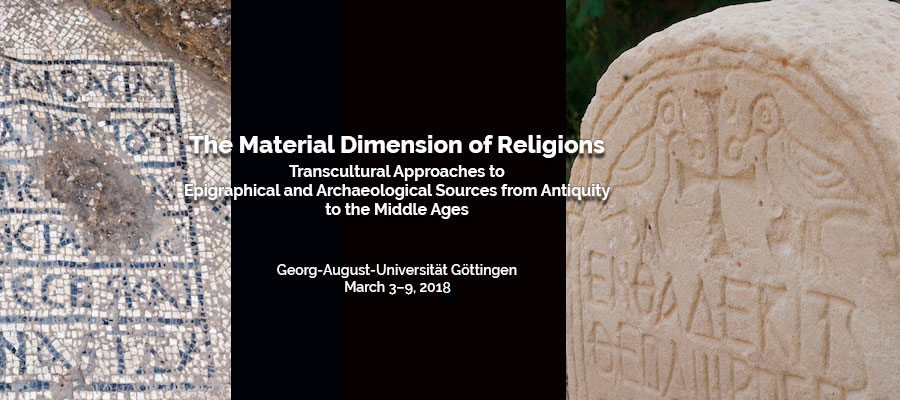The Material Dimension of Religions: Transcultural Approaches to Epigraphical and Archaeological Sources from Antiquity to the Middle Ages, Georg-August-Universität Göttingen, March 3–9, 2018
Notwithstanding the importance of literary texts, the practice of religious cults and rituals is investigated through the evidence of material culture, from inscriptions, paintings, and statues to objects and buildings. However, it is challenging to cope with fragile, scattered, and often fragmentary documents, to study their settings, and to scrutinize their impact on worship and everyday life. Thus, the issue of the materiality of religions merits a scholarly treatment on its own.
The Material Dimension of Religions Spring School is aimed at graduate students and intends to examine theories and methods of investigating religions through epigraphical and archaeological sources in a transcultural and transhistorical approach. The schedule includes seven workshops on Ancient Greece, Imperial Rome, Late Antique Judaism, Early Christianity, Classical Islam, Christian Middle Ages, and Jerusalem as a transcultural place, and four keynotes on Greek epigraphy and religion, religion in the public space, the materiality of texts, and the city of Jerusalem as an example of coexistence and interaction of the materialities of religions.
The spring school will provide an intensive training for interpreting non-literary sources in a historical perspective. The participants will learn how to study religions from inscriptions and material culture. Furthermore, looking at the topography of cities like Rome and Jerusalem, the participants will increase the awareness of processes of interactions and exchanges between religious traditions in antiquity.
The academic programme consists of:
- study in interactive workshop groups; and
- plenary keynote lectures.
The workshops instructors and keynote lecturers are leading scholars in the field:
- Greek Religion and Epigraphy: Eftychia Stavrianopoulou (Heidelberg)
- Roman Religion and Epigraphy: Nicole Belayche (Paris)
- Multilingualism and Inscriptions in Palestina: Werner Eck (Köln)
- Christian Archaeology: Olof Brandt (Rome)
- Late Antique Judaism; Jerusalem: Jürgen Zangenberg (Leiden)
- Islam and Arabic Epigraphy: Ilkka Lindstedt (Helsinki)
- Medieval Christian Epigraphy: Flavia de Rubeis (Venice)
- Material Culture and the Practices of Religion: Thomas Meier (Heidelberg)
- Religion in Public Spaces: Jörg Rüpke (Erfurt)
